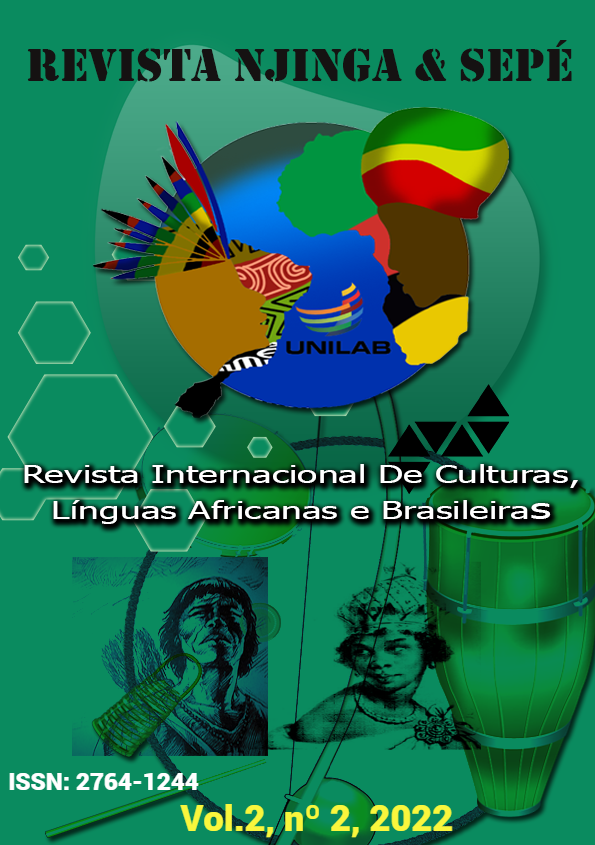7.Estratégias de desenvolvimento de termos em línguas moçambicanas: análise das tendências de comunicabilidade dos termos
Makhinga ya wuwumbi wa mapswi ya wuzivi ka tidimi ta n’tumbunuku: wuxoli wa sikombisu wa wuwombiwombi
Palabras clave:
Línguas Moçambicanas, Terminologia, Estratégias, ComunicabilidadeResumen
Este artigo analisa criação dos termos associados às doenças desenvolvidos nas línguas moçambicanas com base nas estratégias de desenvolvimento terminológico. Em termos metodológicos, compilou-se um corpus constituído por 166 termos associados a 12 doenças desenvolvidas em 6 línguas moçambicanas. Com base nas dimensões terminológicas (cognitivo, linguístico e comunicativo) (Sager, 1990), o estudo constatou que, a comunicabilidade hierarquiza as estratégias de desenvolvimento de termos e este, naslínguas moçcambicanas, exige que se contemple a avaliação dos níveis de comunicabilidade por forma a salvaguardar a comunicação.
***
N’katsakanyu: N’kwepa wuwa wuxola mazumbela ya wuwombiwombi wa mapswi ya wuzivi matsimbilelanaku ni malwati yowumbwa ngu tidimi ta n’tumbunuku. Gondo yiya yimahitwe ka n’cawa wa 166 wa mapswi ya wuzivi ya 12 wa malwati yowumbwa ngu 6 wa tidimi ta n’tumbunuku. Kuxola ka ciyemo ya wukongo, wudimi ni wuwombiwombi (Sager, 1990), gondo yiya yitumbuti to, wuwombiwombi wakabanisa makhinga ya wuwumbi mapswi. Ngu cigelo ci, wuwumbi wa mapswi ya wuzivi wufanela kuxola sigava sa wuwombiwombi kasi kuvhikela kupfana ka wukombisani ka vathu.
Descargas
Citas
Alberts, M. (1999). Terminology in South Africa. Lexikos, vol.9, nº1, p.19–35.
Alberts, M. (2010). National Language and Terminology Policies:a South African Perspective. Lexikos, vol.20, nº1, p. 599–620.
Barros, L. A. (2006). Aspectos epistemológicos e perspectivas científicas da terminologia. Ciencia e Cultura. São Paulo. vol.58, nº2. p.22-26.
Cabré, T. (1999). La Terminología: Representación y Comunicación: Elementos para una Teoria de Base Comunicativa y Otros Artículos. Institut Universitari de Lingüistica Aplicada.
Dlodlo, T. (1999). Science Nomenclature in Africa: Physics in Nguni. Journal of Research in Science Teaching, vol.36, nº3, p.312–331.
Faulstich, E. (2006). A Socioterminologia na comunicação científica e técnica. Ciência e Cultura. Vol.58, nº2, p.27-31.
Gaudin, F. (1993). Socioterminologie: des probèmes sémantiques aux pratiques institutionnelles. Publications de l´Université de Rouen: Rouen.
Gauton, R. ; Taljard, E. ; De Schryver, G.-M. (2003). Towards Strategies for Tralating Terminology into all South African Languages: A Corpus-Based Approach. South Africa. Conference Proceeding. p.81-88.
Madiba, M. (2001). Towards a Model for Terminology Modernisation in the African Languages of South Africa. Languages Matters, vol.32, nº1, p.53–77.
Madzimbamuto, F. (2012). Developing anatomical in an African Language. The South African Medical Journal (SAMJ), 102(3), 132–135.
Mtintsilana, P.; Morris, R. (1988). Terminography in African Languages in South Africa. South African Journal of African Languages, vol.8, nº4, p.109–113.
Nshubemuki, L. (1999). Advances in the Compilation of Istilahi za Elimumisitu—A Glossary of English-Kiswahili Forestry Terminology. Forestry Snow Landscape Research, vol.74, nº2, p.189–194.
Sager, J. (1990). A Practical Course in Terminology Processing. John Benjamins Publishing Company.
Taljard, E. (2007). The Standardisation of African Languages: Language Political Realities. Issues in Scientific Terminology in African/Bantu Languages, p.88–01.
Temmerman, R. (2004).Teori Sociocognitiva da Terminologia. Cadernos de Tradução, nº17, UFRGS, Porto Alegre, p.31-50.
van Huyssteen, L. (2005). The value of oral corpus annotation for improving the acceptability of technical terminology in Zulu. Languages Matters, vol.36, nº1, p.19–40.
Descargas
Publicado
Cómo citar
Número
Sección
Licencia
Derechos de autor 2022 NJINGA&SEPÉ: Revista Internacional de Culturas, Línguas Africanas e Brasileiras

Esta obra está bajo una licencia internacional Creative Commons Atribución-NoComercial-SinDerivadas 4.0.
Los autores que publican en esta revista aceptan los siguientes términos:
Los autores mantienen los derechos de autor y otorgan a la revista el derecho a la primera publicación, siendo el trabajo simultáneamente licenciado bajo la Licencia de Atribución Creative Commons, que permite compartir el trabajo con reconocimiento de la autoría del trabajo y la publicación inicial en esta revista.
Se autoriza a los autores a asumir contratos adicionales por separado, para la distribución no exclusiva de la versión del trabajo publicado en esta revista (p. Ej., Publicación en repositorio institucional o como capítulo de libro), con reconocimiento de autoría y publicación inicial en esta revista.
Se permite y se anima a los autores a publicar y distribuir su trabajo en línea (por ejemplo, en repositorios institucionales o en su página personal) en cualquier momento antes o durante el proceso editorial, ya que esto puede generar cambios productivos, así como aumentar el impacto y cita del trabajo publicado (Ver El efecto del acceso abierto).




